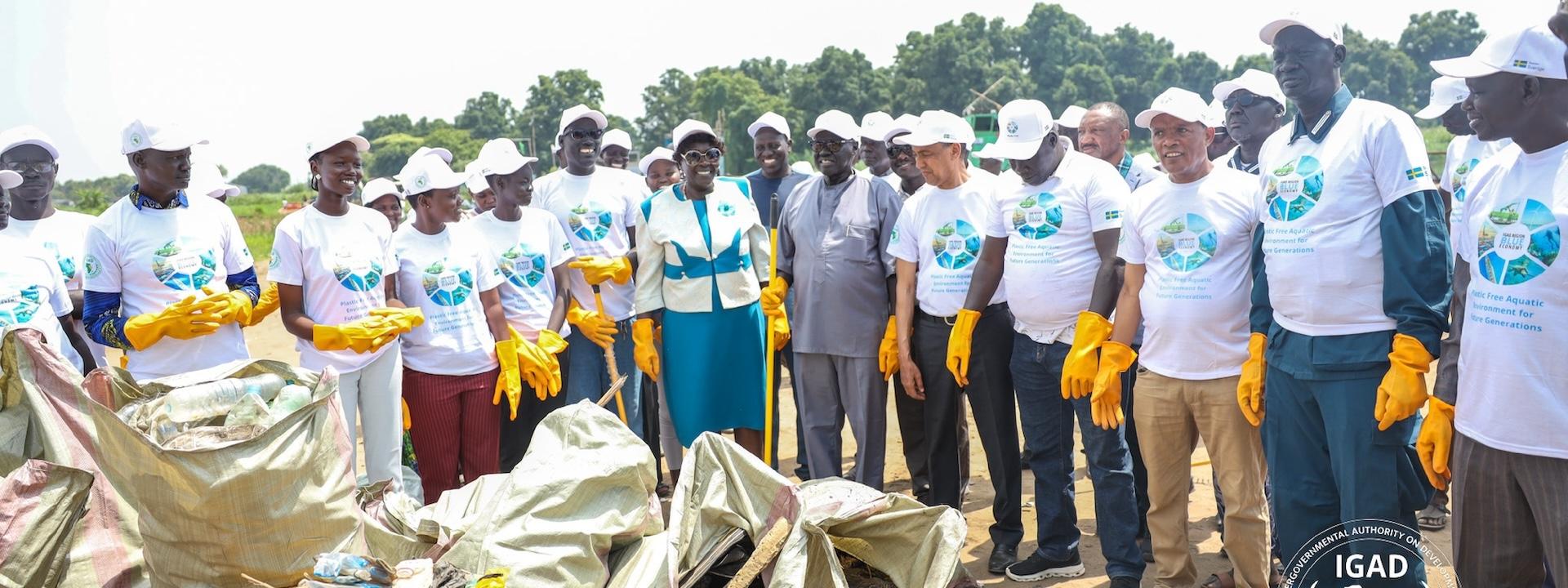June 18, 2024 (Juba, South Sudan): Addressing the emerging issue of plastic pollution in Juba City, the Intergovernmental Authority on Development (IGAD), in partnership with the Government of South Sudan and with the financial support from the Swedish International Development Cooperation Agency (SIDA), has launched the “Nile River Banks Cleaning Campaign Against Plastic Pollution.” This initiative is part of broader goal on “Enhancing Blue Economy in the IGAD Member States for Biodiversity Conservation and Livelihood Diversification” project, aimed at building healthy aquatic ecosystems in order to leverage the Blue Economy’s potential for regional development.
Nowadays plastics have become integral to many industrial and societal functions. The current global annual production of plastics (approximately 450 million tonnes) is predicted to double by 2045, under current trends. The rapid increase in plastic production resulted in uncontrolled leakage into the environment. The inadequacy of waste management to meet this demand is a particular problem for developing countries in general. Plastic pollution of the aquatic environments within the IGAD region is driven largely by rapid urbanization and improper disposal, especially of single-use plastics. The production and importation of single-use plastics for water bottling and shopping purposes is alarmingly increasing in the IGAD Member States. Plastic waste accumulation around our water resources presents a real risk to people’s health and to the health the aquatic ecosystems. IGAD as regional body plans to establish a region framework for monitoring of plastic pollutants. IGAD also promotes its Member States to mitigate environmental plastic accumulation through policy initiatives like taxing non-recyclable products and providing incentives to encourage reuse and recycling of plastics.
Campaign Launch
The campaign, building on previous successful efforts in Tadjourah and Obock Towns in Djibouti, focuses on cleaning the White Nile River banks. The initiative involves active participation from youth and women, underscoring IGAD’s commitment to inclusive and gender-responsive ecosystem management.
During the launching, David Kwaje, the IGAD Head of Mission in the Republic of South Sudan, mentioned that today’s successful River Nile riverbank cleaning campaign, organised by IGAD and the Government of South Sudan witnessed a significant turnout of youth and women. This event underscored the vital role women play in the conservation and sustainable management of natural resources reaffirming the importance of inclusive community engagement in protecting our aquatic ecosystems.
The event was graced by prominent figures, including the Minister of Livestock and Fisheries, H.E. Hon. Onyoti Adigo Nyikwec and Worship Mayor of the Juba City Council, as well as representatives from Ministries of Transport and Foreign Affairs, the EU delegation, and FAO were also in attendance.
His Excellency the Minister of Live Stock and Fisheries expressed his appreciation for IGAD’s support in developing a national Blue Economy strategy and a fisheries co-management plan for the Baro-Akobo Sobat basin, in addition to the current campaign against plastic pollution. The Mayor of Juba underscored the widespread threat of plastic pollution, highlighting that it affects not only the River Nile but the entire city, thereby impacting public health due to the presence of plastic in the daily food supply.
Objectives of the Campaign:
- Plastic Waste Collection: Mobilizing youth and women to collect plastic waste along the White Nile River banksas demonstration practice.
- Sanitation Improvement: Enhancing sanitation at fish landing sites to ensure a clean environment for fish processing.
- Awareness Creation: Raising public awareness about the detrimental effects of plastic pollution on aquatic ecosystems.
- Best Practices Sharing: Promoting best practices for maintaining plastic-free river banks for recreational use.
Outcomes of the Campaign:
- Clean River Banks: Enhanced sanitation along the White Nile River banks through the collection of plastic waste.
- Increased Public Awareness: Heightened public understanding of the negative impacts of plastic pollution on aquatic ecosystems.
- Media Engagement: Extensive media coverage to bring attention to the plastic pollution management agenda.
- Enhanced Livelihoods: Providing alternative livelihood opportunities for youth and women through their involvement in the campaign.
- Ecosystem Protection: Strengthening the role of youth and women in ecosystem protection.
The campaign represents a collaborative effort among IGAD’s Blue Economy Section, the Ministry of Livestock and Fisheries, the Juba City Council, and the Ministry of River Transport. Approximately more than 150 participants from various sectors, including public, private, civil society organizations, and professional associations, particularly those focused on plastic waste management, joined the event.
Conclusion
The Nile River Banks Cleaning Campaign in Juba marks a significant stride towards combating plastic pollution and safeguarding the ecosystem of the Nile River. By involving the community and fostering public awareness, the campaign aims to create a cleaner, healthier environment for future generations. The success of this initiative will not only benefit Juba City but also serve as a model for similar efforts throughout the IGAD region. Promotional materials such as flyers were distributed to raise awareness. Media coverage helped to amplify the campaign’s message, ensuring broad community engagement and support.

